The Plus Factor: How New at-Home Tests Can Help You Crack the Code of Your Microbiome
This week on The Plus Factor, we’re talking about next-gen gut health. Thanks to a new breed of at-home testing kits, understanding your relationship with the millions of microbes that call your digestive system home is more possible than ever before—and that could affect everything from your digestion to your mental health, and even your radiant glow.
Traditionally, if you wanted to know what was going on inside your body, you went to the doctor. Think you have a lactose allergy? They'll administer a time-consuming breath test. Want to know what nutrients you're deficient in? They'll draw some blood. But today, with the rise of biohacking, people are more curious than ever about their bodies—especially gut health, since if your digestion is off, pretty much everything is off. Now, thanks to a new generation of at-home testing now on the market, you can be your own human experiment, poking and prodding yourself in the comfort of your own home.
But what can these at-home tests tell you that a doctor can't? Are they really that insightful? To find out, I started researching the at-home testing genre, comparing all the different options out there. Ultimately, I landed on three new-to-the-market ones to try for myself. I wondered if they would all say the same thing and recommend the exact same diet. So, in the name of wellness, I tried them all—to find out firsthand what this whole at-home testing thing is all about.
Are at-home tests worth it? Keep reading to find out. (Full disclosure: TMI ahead.)
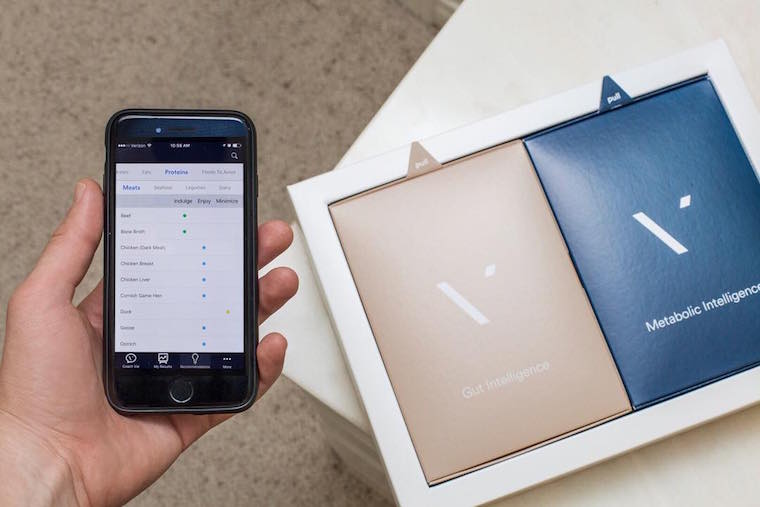
The new microbiome measurers
Researching which test is best can be overwhelming. UBiome is one of the OGs, having been around since 2012. (That tells you just how new this field is.) The company offers three tests: two for gut health (with one being geared specifically for people with IBS) and one for vaginal health. Biohm's gut report—developed by the expert who legit coined the term "microbiome—test tells you exactly what your gut bacteria and fungi levels are—because, FYI fungi is super important to the gut.

{{post.sponsorText}}
Viome is another test that targets your microbiome. After completing both a stool and breath test, you're rewarded with learning the exact types of bacteria your microbiome is high and low in—and what to eat more and less of, to get back in the right balance.
Habit is another new test that ends with a diet recommendation, but looks primarily at what your genes and DNA indicate is best. Once you know, you can sign up for their meal plan, getting food crafted specifically for your genes straight to your door.
But that's not all that's popping up in the microbiome testing world. (Hey, gut health is hot right now.) Ixcela's at-home testing tells you how "fit" your microbiome is, similarly to Viome recommending what you should eat more or less of. This one is a blood test, analyzing 12 key markers in the blood, and based on the findings, recommendations are made for what foods truly work best for your physical—and mental—health.
Then there's DNA-testing company EverlyWell, which has a whole range of tests, pinpointing everything from food sensitivities to how to sleep better. (And as of last night, it's a Shark Tank star as well, with EverlyWell CEO and founder Julia Cheek accepting a $1 million offer from QVC queen Lori Greiner.)
Ultimately, I decided to test out Viome, Habit, and Ixcela. Viome and Ixcela both analyzed the microbiome, but in completely different ways. I wondered if their diet recommendations would be the same, and how they would compare to Habit's, which looked at the genes, not the gut.
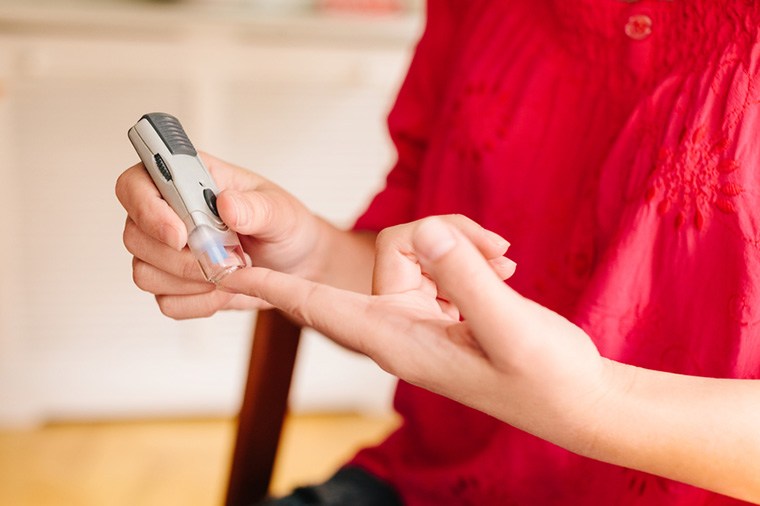
Blood, shakes, and poop
The first one I tried was Ixcela, which costs $299. This one was the easiest to do: a simple finger prick. I had always thought the only way to learn about what was happening in your gut was through a stool test, so I met with the test's developer, biochemist Dr. Erika Angle, PhD, to learn more.
"A stool test may tell you how your gut looks on that given day, but a blood test more accurately can tell you how everything is being absorbed in your gut and distributed throughout your body," Dr. Angle explains. "Depending on the diversity of the bacteria, the gut is going to break things down in different ways." She goes on to tell me that there are crucial blood markers that identify molecules within the gut, hence the 12 Ixcela zeroes in on. In other words: Your blood can tell you a lot about the bacteria in your gut.
Viome founder Naveen Jain, however, was pretty adamant that stool was the way to go. "We've seen through repeated testing that unless someone drastically changes their diet, stool tests are pretty consistent over time," Viome's chief medical officer, Helen Messier, MD, PhD, tells me. Welp, here goes nothing, I thought as I completed the stool sample portion of the test. (Fun fact: Did you know you can mail poop through the mail in New York state but not blood?)
For the second part of the Viome test, I was tasked with downing the kit's shake mixture and recording my heart rate four times over the course of a couple hours to see how quickly my body processed the glucose. I also recorded my saliva and urine pH levels before and after drinking the shake. The cost for this all-encompassing test? $399. Despite the hefty price tag, Jain stressed to me that his ultimate goal was to make Viome so widely available that it would be free—or close to free. He spoke very passionately about how it was information everyone deserved to know.
And finally, I tried Habit ($299), which isn't actually legal in New York state yet—since you have to mail your blood. So I went to New Jersey to do it. This was a mix of finger-pricking and shake-drinking. Similar to Viome, part of the test was downing a shake and seeing how my body interacted with it. I was tasked with taking blood samples at different intervals over the course of two hours, all of which I mailed off to be analyzed. Now that all the testing was done, I was ready to get my results.

My results: the Habit test
According to my Habit results, I should eat a diet that is 50 percent carbs, 30 percent fats, and 20 percent protein. The recommendation surprised me because for the past two months I had been following the ketogenic diet and felt better than ever. To get more insight, I called Jae Berman, Habit's head coach, to go over my results.
Together, we discussed my DNA (what you're born with and can't change) and blood markers (which can change based on diet and lifestyle habits). "Looking at your blood markers, we can see how well your body processed the glucose in the shake," Berman says. "We can see that your blood sugar went up, then down, which is exactly what we want it to do." She called out some other cool things too, like how well my body processes healthy fats—which is where the 30 percent fat recommendation comes in. When it comes to my DNA, I am predisposed to gain weight easily (yikes), could have a lactose allergy (this I felt was true), and metabolize caffeine well.
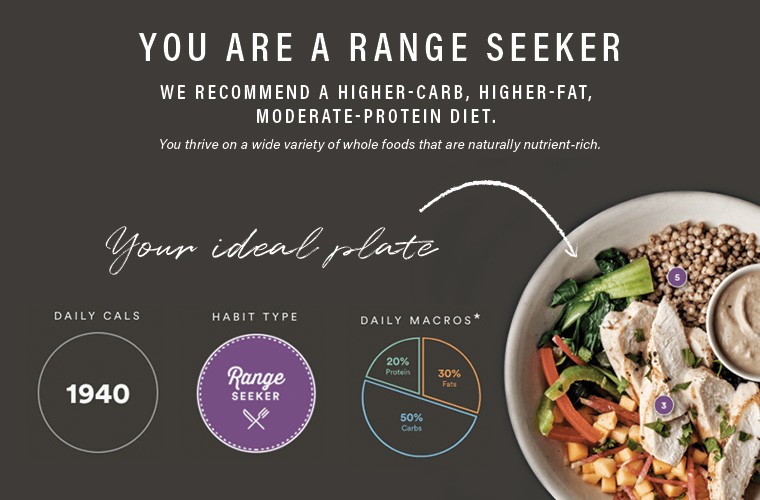
"The DNA markers are impactful because it shows what genes you test positive for, but just because your genes say something doesn't mean it is destined to be that way," Berman explains. "That's where the blood markers come in, which you can change through diet and lifestyle."
When I brought up the fact that I recently cut out carbs and felt better than ever, Berman pointed out that Habit does not yet look at how the body processes food, so any digestive probs aren't really being picked up. That was a bummer to me, since the biggest reason I was interested in at-home testing was to feel my best (AKA no bloating or tummy troubles). Still, I was impressed with the science behind Habit and would recommend it as a starting point for someone to know how to work with your body, and not against it. I understood how that could lead to better energy and weight loss, if that was your goal.
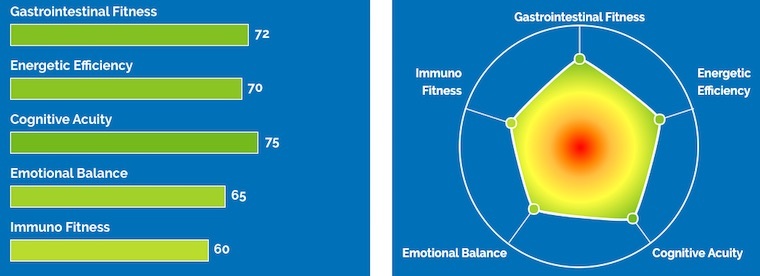
My results: the Ixcela test
The Ixcela test was more directly related to digestion. My gut health was given a score of 72 out of 100. When I called Dr. Angle swearing I was better than a C student, she was understanding. "It's lower than we like to see, but it isn't that bad actually," she says. "No one gets 100 percent on this." What I like about the Ixcela test is that it has recommendations that would help my digestion as well as anxiety—since mental health and the microbiome are linked.
The food recs: more foods high in fiber, whole grains, vegetables, and nuts. Oh, and I could really use a prebiotic and probiotic, according to the results. There was a ton of detail provided, such as exactly what was in the recommended foods that would help (like tryptophan). The one thing that tripped me up was that some of the foods they suggested I eat, like chickpeas and yogurt, I know don't sit well with me.
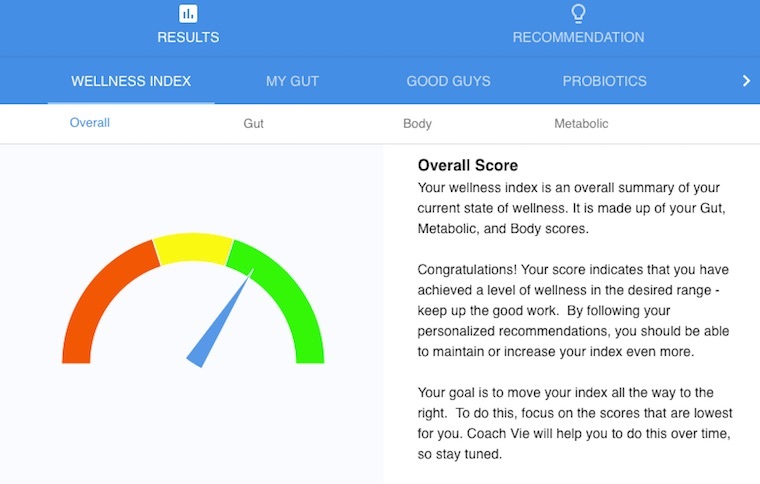
My results: the Viome test
Viome was the one that really blew me away. When I went over my test with Jain, the founder, and Dr. Messier, their chief medical officer, I was seriously impressed with their smarts. Viome is the first test that not only pinpoints all the bacteria strains in the gut, but also any viruses, which are associated with poor health. Dr. Messier tells me that most people have less than 1 percent of viruses in their gut, which is what you want. Mine was at 5 percent—yikes.
"What we can tell from the stool test is that your cells in your gut lining are shedding and showing up in your stool. This is a sign of inflammation," she says. She also showed me that the diversity in my gut was high—but not diverse in the good bacteria. She called out one specific "bad" bacteria in my gut that thrived on meat. "Because of this, I would suggest a primarily plant-based diet," she says. Based on their recs, my ketogenic lifestyle would need a lot of tweaking.
She could tell that I did a lot of cardio-based workouts based on the pathways that bacteria are responding to and converting into energy.
Amazingly, she could also tell that I did a lot of cardio-based workouts based on the pathways that bacteria are responding to and converting into energy. There were other moments I was blown away too, like when she asked me if I ate a lot of portobello mushrooms. I actually took a vitamin D supplement every day sourced from portobello mushrooms, so yes! The dietary recommendations for me included avoiding all gluten and all dairy. And, echoing Ixcela's report, Viome urged me to take a probiotic and get more plants in my life. "Plant fibers protect the gut lining," Dr. Messier explains.
After our call, I realized I had a big decision to make. If I took this advice seriously, I'd have to drastically change my eating habits—cutting ties with the ketogenic diet. I felt good on the keto diet. But what if I could feel even better?
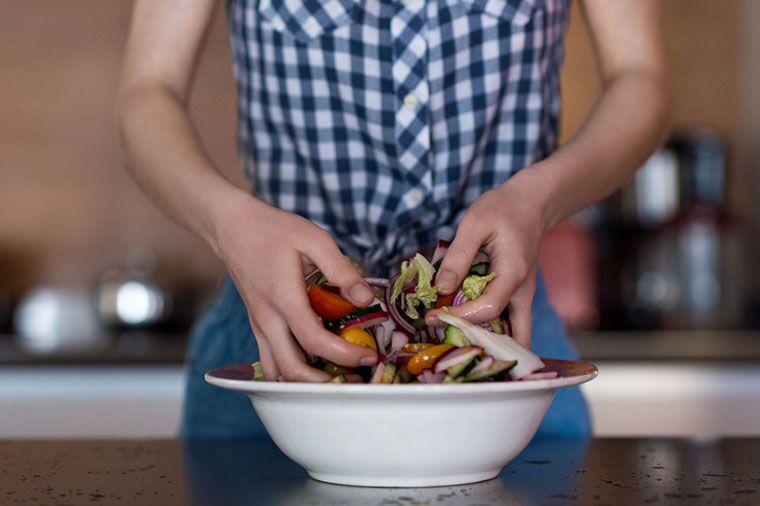
Where to go from here
Despite getting varied results from the three tests I took, the whole at-home testing experience was extremely eye-opening and I ultimately think they are actually better than what you can find out at the doctor's office. A bold statement, but I'm sticking by it.
Case in point: A well-respected—and pricey—gut doctor told me several months ago that according to my blood tests I would benefit from taking oregano oil capsules every day (along with four other supplements), so I started doing so. But when Dr. Messier was going over my Viome results with me, she told me to stop taking them immediately. "Oregano actually kills good bacteria," she says. The reason why I trust her test more than the doctor who prescribed them: She is able to look at a bigger, more detailed picture. Sure, most doctors can tell you if you need a probiotic or not. But knowing how the exact strains hang in the balance? Maybe not.
What to consider when deciding between the new options in the at-home gut-health game? My advice: Focus on how much you're willing to pay, what exactly you want more insight on (gut health, sleep, genetics, etc.), and actionable advice you can put into practice. Learning about your body is great, but it's even better when your test can tell you how to take that info and improve your life. And if you still can't decide what to zero in on? Go with your gut—it tells you a lot.
If you want to learn more about biohacking, consider this your cheat sheet. FYI you can even biohack your orgasm.
Loading More Posts...